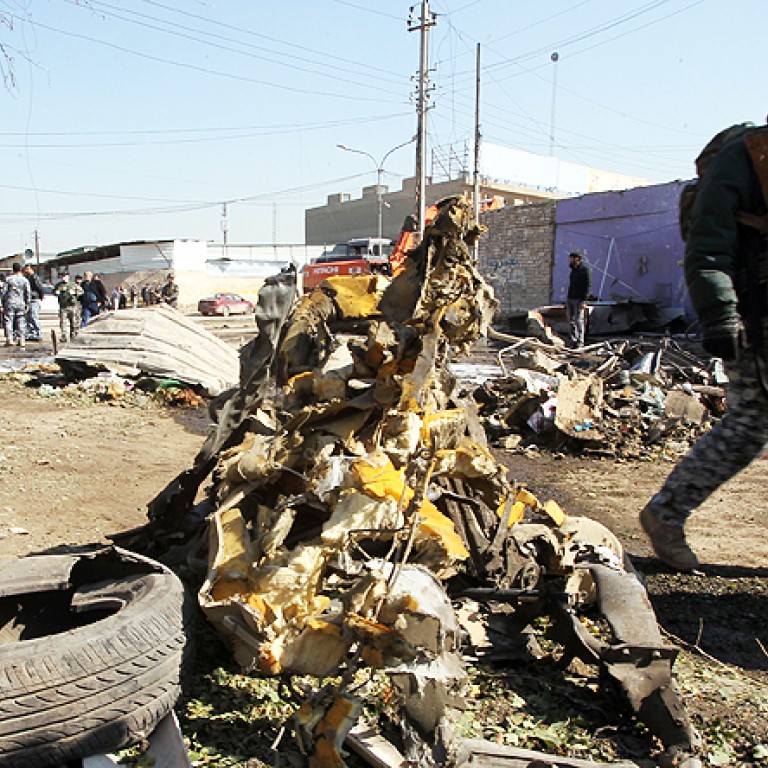
Six car bombs hit Baghdad as US lawmakers slam Maliki
Five people killed as bombings follow spate of attacks in Iraqi capital on Wednesday that left 33 dead
Six car bombs ripped through Baghdad killing five people on Thursday, hours after American lawmakers criticised the slow pace of political reconciliation which they blamed for high levels of violence.
The blasts, which mostly targeted Shiite-majority neighbourhoods of the Iraqi capital, come amid the country’s worst protracted period of unrest since 2008 as security forces grapple with near-daily attacks and battles with anti-government fighters in Anbar province.
Diplomats and analysts have called for the Shiite-led government to do more to reach out to disaffected Sunnis, but with parliamentary elections looming in April, Prime Minister Nuri al-Maliki has taken a hard line.
The bloodshed has continued unabated, with half a dozen car bombs going off across Baghdad from about 5pm Hong Kong time onwards.
In all, they killed at least five people and left 38 others wounded, according to security and medical officials.
Four of the neighbourhoods hit are populated mostly by Iraq’s Shiite majority, while the other two were in the commercial Karrada district of central Baghdad. Three of the blasts targeted market areas.
The blasts come a day after a spate of attacks in the Iraqi capital left 33 people dead, including 25 who were killed in a series of bombings near the heavily-fortified Green Zone, which is home to parliament, the prime minister’s office and the US and British embassies.

No one immediately claimed responsibility for the latest attacks, but Sunni militant groups including the Islamic State of Iraq and the Levant (ISIL), a powerful jihadist outfit, have in the past taken credit for bombing campaigns in the capital targeting Shiites.
US House Foreign Affairs Committee chairman Ed Royce said on Wednesday that Maliki’s failure to do more to address Sunni grievances had allowed ISIL to exploit the minority community’s “alienation” to sharply step up its attacks.
“As head of state, while he may not be up to it, Maliki must take steps to lead Iraq to a post-sectarian era,” Royce said.
“Al-Qaeda has become very skilled at exploiting this sectarian rift, and Maliki’s power grab has given them much ammunition.”
US Deputy Assistant Secretary of State for Iraq and Iran Brett McGurk insisted Maliki had made changes since he visited Washington in November and “got a very direct message” from President Barack Obama on “enlisting the Sunnis into the fight”.
ISIL has also been fighting security forces in Anbar, a mostly Sunni desert region bordering Syria where militants have held parts of Ramadi and all of Fallujah for weeks.
Security forces and tribal auxiliaries have made slow progress in Ramadi but recaptured several neighbourhoods late on Tuesday.
In Fallujah, however, security forces have largely stayed out of the city for fear that major incursions could spark high civilian casualties and heavy damage to property.
The city was a bastion of the Sunni insurgency following the 2003 US-led invasion, and American troops there fought some of the costliest battles since the Vietnam War.
Ahmed Abu Risha, a prominent tribal leader in the Sunni Awakening movement, which allied with US troops against al-Qaeda and now supports the government, said an attack on the city was imminent and has urged anti-government fighters to lay down their arms.
The stand-off in Anbar has prompted more than 140,000 people to flee their homes, the UN refugee agency said, describing it as the worst displacement in Iraq since the peak of the sectarian fighting.
